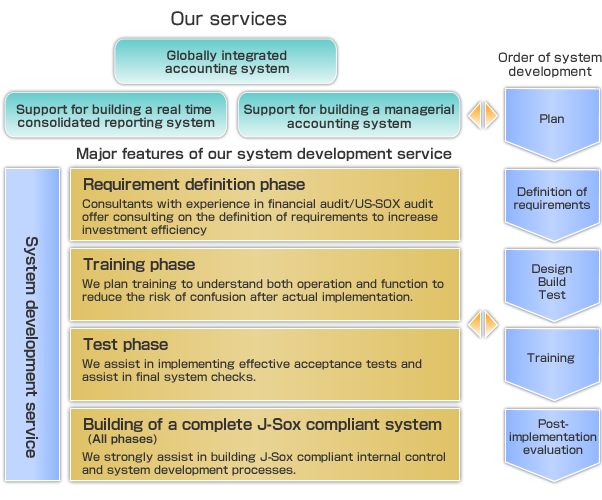


IT structuring/Operational area (ERP system development service)
We accelerate the group’s financial closing process and realize the managerial accounting targets established by our management accounting system consulting service by building the optimal system for your company.


ERP implementation consulting to increase investment efficiency
ERP implementation consulting to increase investment efficiency
ERP is set up for current business practices without the necessary review, and as a result many add-on functions are implemented.
In trying to reduce system development costs, insufficient functionality in the standard version is supplemented by using manual functions.
The above risks can be greatly reduced by effective user training before actual operations begin. The first risk is caused by a lack of understanding/experience with the system’s functions and the second risk is caused by a lack of understanding/experience with the business’s operations. Both can be resolved through proper training in system functions and operation. As such, user training is a critical task, and establishing effective training plans directly affects smooth operations after implementation.

Planning training that explains both the operation and functions of the new system
Planning training that explains both the operation and functions of the new system
In general, ERP has many items that need to be input and is hard to operate so users may feel it is an excessive burden after implementation. Not only does this affect operational efficiency, reducing work speed, it also affects operational effectiveness, with necessary items not getting input.
Since the flow of operations changes greatly after the implementation of ERP, it is common to see confusion when handling new tasks. In addition to internal confusion, when there are problems in transactions with external parties, such as invoicing errors to customers, it can damage the company’s trustworthiness. Also, there is a risk that this confusion would be seen as a serious internal control weakness.
The above risks can be greatly reduced by effective user training before actual operations begin. The first risk is caused by a lack of understanding/experience with the system’s functions and the second risk is caused by a lack of understanding/experience with the business’s operations. Both can be resolved through proper training in system functions and operation. As such, user training is a critical task and establishing effective training plans directly affects smooth operations after actual operation begins.

Support for performing appropriate user acceptance tests
User acceptance tests are important tests done by the users to determine whether the system has been built according to the specifications decided in the requirement definitions. However this means that the users are testing new tasks on a new system they have never used before. Therefore the test cases may not be comprehensive and the test is too focused on the functional aspects. It may not have checked the operational aspects, ending with the testing incomplete. The possible consequence of this is unexpected breakdowns/operational confusion after actual operations begin. To avoid the above problems, system consultants experienced in financial audit/internal control audit provide total support from both operational and system perspectives from the creation of test cases to the performance of the test.

ERP implementation consulting for operational efficiency and internal control improvement
In ERP internal control functions are provided in the standard functions, and it is possible to build a system that is in compliance with US-SOX/J-SOX. Our system building service has consultants experienced with financial audit/US-SOX audit assist you during implementation and we offer the following SOX related services.
Operational controls
In trying to reduce system development costs, there is a common trend in ERP implementation to make heavy use of manual procedures for operations not covered by standard functions, to avoid add-on system development. However, if manual operations are added excessively they obstruct the accuracy of operations and the completeness of approval, and the probability that there will be material weaknesses in the SOX internal control system increases. With our service we aim to improve operational efficiency and ensure effective internal control by defining the system and manual operations or building appropriate controls when using manual operations.
IT general controls (Access control)
In ERP it is possible to set users and their duties in detail for every level. As such, when users and duties are set up properly, it is possible to clear access control levels required by IT general controls. It is, however, common to see cases where the strict internal control functions that ERP comes with are not being employed because they were incorrectly set up. We provide consulting on the definition of users and duties that can clear SOX from an internal control audit perspective.
System development control is also targeted in IT general controls. We provide consulting on system development control so that you clear the points an external auditor who performs an internal control audit looks for.

Training system engineers (SEs) who can solve customer business issues
Since systems are developed to resolve business issues, SEs must understand not only the system, but also business operations and accounting. It is also necessary to recognize whether a new task is legitimate in internal control terms. However, normal courses on these topics start from an explanation of journal entries, and SEs cannot understand the connection between job flow and the accounting processes. The truth is that unless young SEs start with actual projects and study through OJT there is very little opportunity for them to acquire knowledge about the operations/accounting/internal controls of the company. Our program uses actual operation flows as seen in the company so they understand accounting and internal control, in addition to the flow of important processes such as sales, allowing them to gain practical experience.
